 | E-mail to Birds Korea |
 | KWBS |
in the Region
 | The Oriental Bird Club |
 | BirdLife International (Asia) |
December
Periods of intense cold alternate with milder spells. In the coldest winters maxima are often below freezing; in milder years (such as 2001 and 2002) maxima often reach 10°C in Seoul: a few lingering autumn migrants can still sometimes be found as well as huge numbers of wintering waterbirds.
A great time for full winter bird tours or a couple of days in the right areas. Saunders's Gulls are widespread, while Relict Gulls also start to appear at a number of sites, especially in cold winters. Scaly-sided Merganser move southward onto unfrozen rivers, while numbers of Baikal Teal remain at their peak - often dispersing southward from Seosan, along with large numbers of Greater White-fronted and Thick-billed Bean Geese with the onset of subzero temperatures. Taiga Beans too can be found in the low thousands at Woopo, Joonam and in the Nakdong in the southeast, the mildest part of the mainland.
Raptors include good numbers of Cinereous Vulture (especially in recent years) and these are often joined by White-tailed and several Steller's Sea Eagles, while cranes (Red-crowned, Hooded, and White-naped), remain at key sites.
Passerines include occasionally abundant Brambling, mixed flocks of Naumann's and Dusky Thrushes and in some winters large numbers of Siberian Accentor. Species such as White's and Pale Thrush, Red-flanked Bluetail and Japanese White-eye also remain in reasonable numbers on Jeju Island and in the far southeast. Highlights in December 2002 included Korea's first Great Black-headed(or Pallas's) Gull in Seoul, Pigeon and Spectacled Guillemots off the east coast, and several Red-throated Thrushes and Chinese Nuthatches in the northwest. Highlights in 2003 included Korea's first Grass Owl - found dead on Heuksan Island.
(The following records are a compilation of our own sightings and records sent in by other observers. As well as being posted on the Birds Korea website(s), selected records are also forwarded to other Korean-language birding websites; records of threatened species are arranged and forwarded to Birdlife International and national authorities when appropriate; flag images and records are passed to bodies responsible for their coordination throughout the flyway; and all records sent to us are used to compile annual reports and to support the evolving understanding of the status of many of Korea’s birds.)
Upo ramsar site, December 31
90 White-naped Crane, 2,400 Bean Geese, 800 Mallard, 400 Pintail, 1 White Spoonbill, 1 White tailed Eagle, 1 Hen Harrier, 1 Common Kestrel.
Gunsan am and SE river pm, December 30
"Only" 1,000 Baikal Teal, with no birds close to the newly erected food stalls at the "birdwatching point" and "hides" designated by Gunsan City: disturbance has increased hugely through poor design and planning as the city tries to sell itself as an eco-tourism destination.
Best species on the freshwater lake/river was the male Red-crested Pochard still, while 2 Black-faced Bunting and ca 10 Olive-backed Pipit were also noteworthy. On the estuary, at least 320 Saunders's Gull near the barrage, and 15 Swan Goose.
In the SE, one hour of checking various stretches of river produced a total of ca 15 Japanese Wagtail, and outstanding highlight: 5 Scaly-sided Merganser (4 females and one stunning male).
Nakdong estuary and Joonam Reservoir, December 29 pm
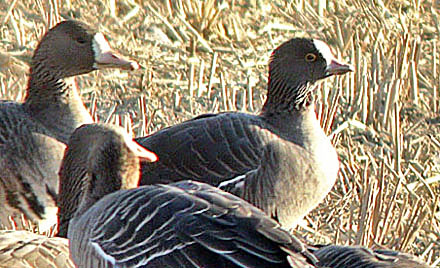
Arriving in Busan at 1 pm, we spent only 1 hour at the Nakdong and 1.5 hours at Joonam.
Highlights were a first winter Relict Gull and 5 Swan Goose on the Nakdong, and excellent views of a Lesser White-fronted Goose at Joonam (though no sign of either White-naped Crane or Red-crested Pochard, the latter, a female, being seen there on the 23rd).
Various locations, December 21 - 28
Summing up various sightings, Mr Lee Gi Seup has estimated the following nationwide maximum counts:
Red Crowned Crane: 735, White Naped Crane: 2,736, Hooded Crane: 196
Red Crowned Cranes:
- 653 in Chelwon plain (26, 27th Dec.)
- 10 in Ganghwa island and Gimpo (27th Dec.)
- 72 in Yeoncheon area (27th Dec.)
White Naped Cranes:
- 2,290 in Chelwon plain (26, 27th Dec.)
- 93 in Han estuary (28th Dec.)
- 73 in Imjin estuary (19th Dec.)- 67 (22nd Dec.)
- 13 in Yeoncheon area (27th Dec.)
- 250 in Nakdong estuary (22nd Dec.)
- 17 in Joonam reservoir (21st Dec)
Hooded Cranes:
- 1 in Han estuary (28th Dec.)
- 195 in Suncheon Bay (22th Dec.)
Haenam, December 18 - 26
1 Oriental White Stork observed on 18th Dec, 7 individuals on 19th Dec, and 8 on 26th Dec
Geum, Mangyeong Rivers and the vicinity of Gunsan, December 26
Black-necked Grebes were in the Geum River Estuary. In a well reeded canal a single Moorhen was seen. Both Pallas' Reed and Reed Buntings were seen there too. Up-river a pair of male Falcated Teal and perhaps a few hens were rafting with the Mallards. Too our surprise the Red-crested Pochard remained for the second week. A group of 45 Carrion Crows were seen near the airport.
Seosan, December 26
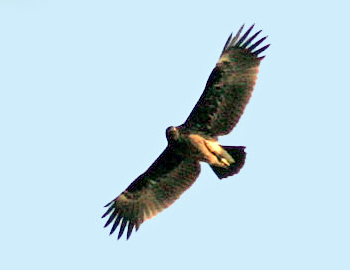
Amongst a selection of good birds, highlights were 57 Eurasian Spoonbills, 95 Whooper Swans, 2 Snow Geese, 1 Great Bittern, 3 Greater Spotted Eagles, 1 Imperial Eagle, 6 Cinereous Vultures, 3 White-tailed Eagles, 2 Peregrine Falcons, 2 Northern Goshawks, 1 Eurasian Sparrow Hawk.
Okku, December 25
One adult Glaucous Gull sitting a couple of hundred meters out on the mud at high tide.
Hong Island, December 25
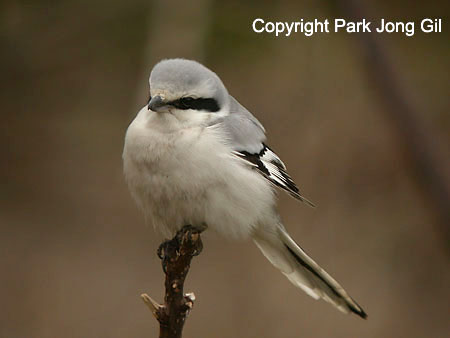
1 Chinese Grey Shrike
Joonam Reservoir, December 23
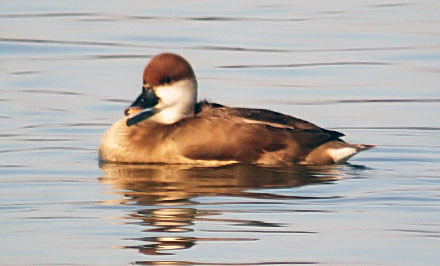
1 female Red-crested Pochard - a rare winter visitor this follows a male found on the Geum on the 21st.
Suncheon Bay, December 22
150-195 Hooded Crane and 7 White Spoonbills, a "flock" of Saunder's Gulls, and 1,200 Common Shelduck.
Upo ramsar site, December 21 - 22
2,500 Taiga Bean Geese, 5 Whooper Swans, and 10 White-naped Cranes passed overhead.
Joonam Reservoir and Nakdong estuary, December 21 - 22
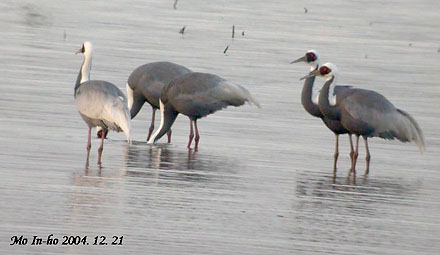
80 White-naped Cranes arrived and stayed in Joonam reservoir on 21st December.
200 White-naped Cranes observed in Myungji Tidal flat and one island in the estuary in the morning of 22th December.
Ganghwa Island (Choji-Ri), December 21
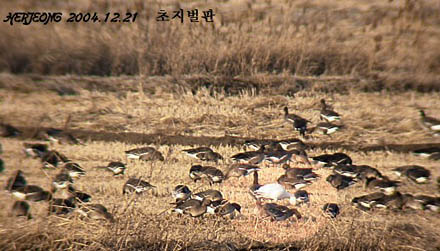
Snow Goose and 10,000 Greater White-fronted Geese.
Hwajinpo, East Sea, December 21
8 Mute Swans.
Geum Estuary, December 21
ca 200 Saunders's Gull in the estuary, and possibly ca 400,000 Baikal Teal on the river several kms upstream of the barrage: the latter very distant likely due in part to the presence of very poorly designed bird hides overlooking their usual roosting area.
Gwangneung Arboretum and Cheorwon, December 20
Excellent views of 2 Solitary Snipe, White-backed Woodpecker (3 in total), Brown Dipper, along with an assortment of typical forest and forest edge birds. En route to Cheorwon, 2 Long-billed Plover, 2 Japanese Wagtail and 4 Common Snipe, while at Cheorwon itself, at least 220 Cinereous Vulture present at the feeding station, with one White-tailed Eagle (with 2 more seen ca 30 Km south). In addition, at least 25 Red-crowned and 30 White-naped Cranes.
Guem river in Daejeon, December 19
130 Ruddy Shelduck.
Geum River and Estuary, December 19
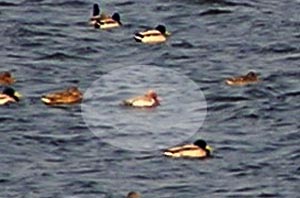
© Jake Maclennan.
At the Geum River 121 Eurasian Culews were counted. Several osculans Oystercatchers were seen down river.
Up-river, Jo Kyoo-shik an officer of The Korean Association for Bird Protection told us of 300 Northern Shovellers that had moved into the river recently. There we all saw a male Red-crested Pochard - a rare winter visitor to Korea with probably less than 10 records (all since 1998).
Chiak San, Namhangang and Taehak San, Gyeonggi Do, December 19
Few birds of note at Chiak San, with best being a single Goshawk and at least 8 Brown Dipper. On a short stretch of the Namhan River at least 125 Goosander and 2 Siberian Accentor (still rather scarce this winter apparently), while at Taehak best was another Hazel Grouse.
Gangneung-Jumunjin and Odae San National Park, December 18
A brief check of several coastal sites produced small numbers of White-winged (20) and Black Scoter (2), and a challenging mix of gulls.
Easily most numerous were Common Gull, with at least 2 500 counted (including one flock of 1400), showing the typically huge range in structure, bare parts coloration and plumage that is typical of the species. At least several first winters were identified as heinei.
In addition, 2 Glaucous Gull, only 2 Mongolian and 3 taimyrensis gulls, 30+ Slaty-backed, a possible juvenile American Herring Gull and what appeared to be an adult Thayer's Gull - a species previously recorded ca 7 times in Korea, with several of these records from the same general area.
In the afternoon, a visit to Odae San produced 2 Japanese Wagtail, 1 Brown Dipper, 10 Azure-winged Magpie, 4 Cinereous Vulture and a Hazel Grouse. Most unexpected was a probable Korean Bush Warbler heard calling twice: if confirmed, it would have been an exceptionally late record of this summer visitor.
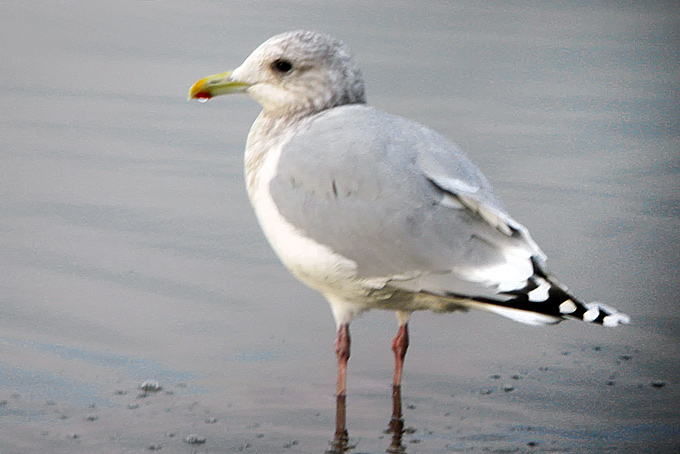
Ganghwa Mani San, and Chiaksan NP, December 17
A few hours at Manisan produced 2 Pale and several Dusky Thrush, a Hawfinch, more excellent views of brandti Jay, several overflying Olive-backed Pipit and 3 Common Buzzard. A very brief scan of the tidal-flats produced no Red-crowned Crane, but instead ca 4 500 Greater White-fronted Goose. At Chiaksan in the late afternoon, best was a male Black Woodpecker that flew in calling to enter a hole in the tree less than 20 m away...other species there included Eurasian Nuthatch, Varied Tit, and a single Brown Dipper.
Gwangneung Arboretum, and Bukhansan, December 16
With very mild conditions persisting and lots of disturbance ongoing in the arboretum, few birds of note. Very best were at least 2 Solitary Snipe (one sleeping on a rock out in the open), and a single white-headed Long-tailed Tit, with the only unexpected species being single Brown Dipper and 2 Japanese Wagtail.
In a small area of Bukhansan, visited in an unsuccessful search for Pallas's Rosefinch, also few birds of note, with e.g. 4 Great Spotted Woodpecker, brandti Jay and a dozen each of Varied and Marsh Tits the most interesting.
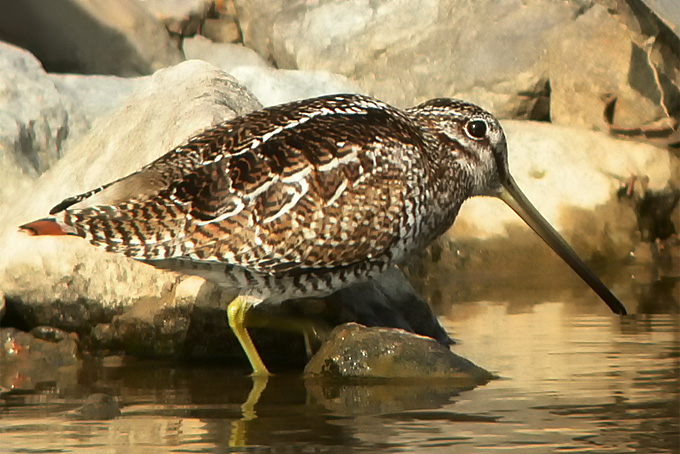
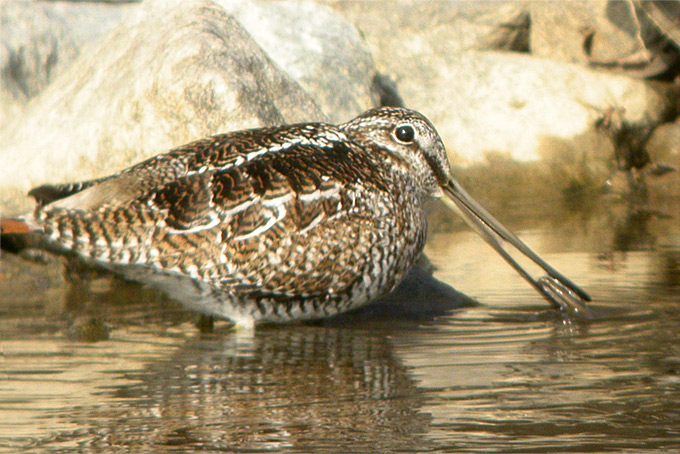
Geum and Man-gyeong Rivers plus Gunsan vicinity, December 12
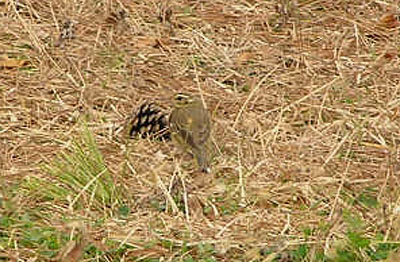
We started the day well with a brief view of a Water Rail in a canal near the Geum. In the estuary 22 Swan Geese were seen. In the adjacent park a few good passerines were viewed including; Reed Bunting, a single Black-faced Bunting, Olive-backed Pipits (regular here for the last few weeks), but the best there was a single Bluethroat.
On the way to the Man-gyeong a stop by a wooded road was productive with a large active group of mixed Tits, as well as Goldcrests.
At the Man-gyeong Estuary more than a dozen White Spoonbills were seen. The Okku Reservoir had a Red-throated Diver that was seen well. At the end of our birding day we stopped at Eun-pa Park: a Northern Goshawk and a male Hen Harrier were there.
Seosan, December 7 - 9

Amongst a selection of good birds, highlights were 5 Oriental White Stork, 8 Cinereous Vulture, about 50 White Spoonbill, and 1 Upland Buzzard.
Nakdong estuary am and Joonam Reservoir pm, December 9
In mild and sunny conditions, few birds of note seen during an hour or two at the Nakdong, with best being a single Peregrine, 5 White Spoonbill, 5 Black Kite and over 1,000 Whooper Swan in the limited area visited.
At Joonam, no cranes, with outstanding highlight being the 2 Cackling Goose still (1 adult and presumably 1 juvenile/first winter, based on the browner tones in the cheek patch and the neck), feeding in amongst 450 Greater White-fronted Goose. On Dongpan, 10 Dusky Thrush (eunomus), ca 250 Baikal Teal, and possibly over 3,000 Common Pochard.
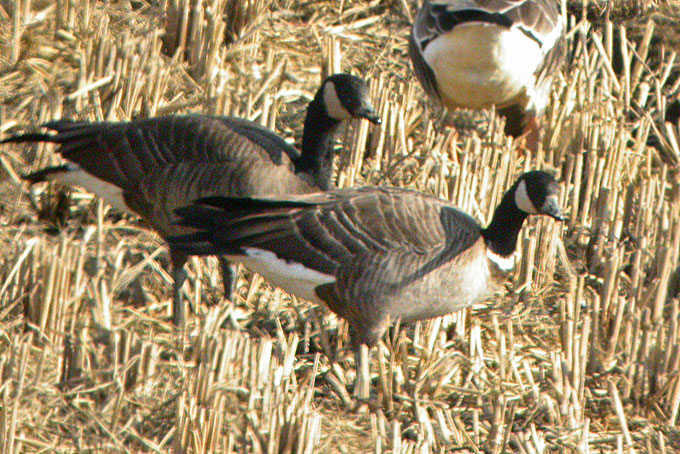
Joonam reservoir, December 6
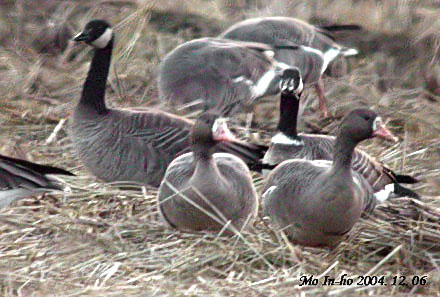
© MO In Ho.
2 "Canada" Geese. The birds pictured below belong to a taxon now called Cackling Goose Branta hutchinsii, and the individual on the right of the image looks to be B. h. leucopareia, as it shows such an obvious white neck patch. Although Park Jin-Young (unpublished thesis, 2002) suggests that the most regularly-occurring subspecies in Korea is leucopareia, most images of the species in Korea on websites as well as individuals seen in the field lack this neck collar and perhaps can be ascribable to other subspecies.
The Cackling Goose is a scarcely annual winter visitor to Korea, with the largest concentrations to date being of 7 in Suncheon Bay on January 30th, 1999, and between 5 and 7 at Cheorwon, on October 18th, 2003.
(Cackling Goose was formally named in: Banks R., Cicero C., Dunn J., Kratter A., Rasmussen R, Remsen J., Rising D., and D. Stotz. (2004). Forty-fifth supplement to the American Ornithologists' Union Checklist of North American Birds. Auk 121: 985-995.)
Jeju
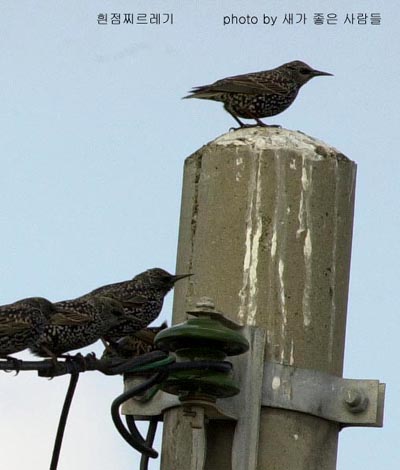
About 100 Common Starling appear to be wintering on Jeju. The Common Starling is listed in Lee, Koo, and Park (2000) as a vagrant, but it is regular though scarce in the south of the country and is best looked for associating with large flocks of the (genuinely) common and widespread Grey Starling.
Yongjong Island, December 5
A cold and windy Yongjong Island produced very little birdlife. Most exciting was excellent views of a Peregrine diving into a mixed flock of Mallard, Tufted Duck and Pintail: the Peregrine failed only because his target eventually dived underwater as if it was a Gannet. Other sightings included 197 Ruddy Shelduck, 100 Grey Herons in a 100m stretch of shore, 11 Skylarks and a single Common Buzzard.
Jeju, December 4
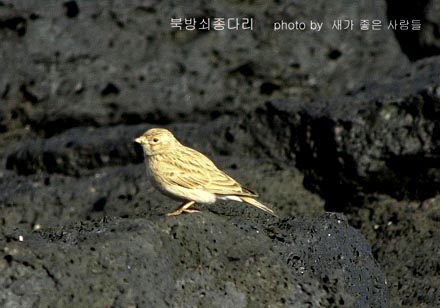
1 Asian/Lesser Short-toed Lark. Although considered to be an uncommon passage migrant by Lee, Koo and Park (2000), the species is more likely a rare winter visitor and migrant. Based on records known to Birds Korea over the past 5 years, it is probably scarcely annual to South Korea.





